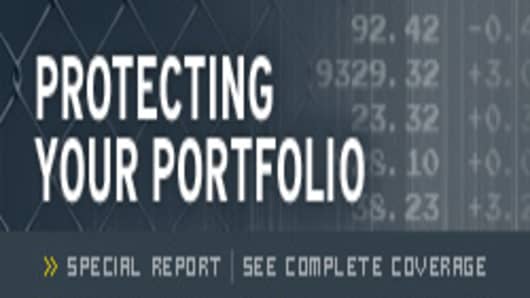Bank and brokerage failures, government bailouts, a sickly mortgage market and sinking stock prices. What’s an investor—or consumer—to do?
Amid the turmoil of a conventional recession and a one-of-a-kind credit crunch an obvious line of questioning is staring you in the face. How safe are your deposits at banks and brokerage firms? And what happens if any of these financial institutions go belly up?
The short answer is don't worry—too much.
“The greatest risks to small investors and savers right now are a decline in the value of their retirement account accumulations and a decline in the yields on interest bearing accounts at the same time inflation is increasing,” says Stephen Brobeck, executive director of the nonprofit advocacy group Consumer Federation of America. “No one whose deposits are guaranteed by the federal government should worry about losing a dime.”
Quite right. The U.S. government has multiple safety nets in place to protect people with money at financial institutions across the country, from commercial banks to credit unions to brokerage firms.
Still, there are limits to how much of that is insured and what type of deposits qualify for coverage, making it critical that consumers take inventory of their own accounts.
There are also a few key steps you can take to maximize your coverage and safeguard your cash — just in case. Here’s a who’s–who-and-what’s-whatbreakdown.
Cash Deposits
The Federal Deposit Insurance Corp. (FDIC), your first line of defense, protects you against the loss of your deposits if an FDIC-insured bank or savings association fails.
Created in 1933, following a rash of bank failures during the Depression, the government corporation insures all deposits at insured banks, including checking, NOW and savings accounts, money market deposit accounts and certificates of deposit (CDs) up to $100,000 per depositor per insured institution.
The FDIC also insures retirement accounts, including individual retirement accounts (IRAs) and Keoghs for up to $250,000 per depositor per insured entity.
More For Investors...
Since its founding, the FDIC boasts no depositor has lost a “single cent of insured funds as a result of a failure.”
You can check to see whether your bank or savings association is FDIC-insured (most are) by calling 877-275-3342 or using the agency’s online “Bank Find” tool.
“If you are very conservative and worried about losing money, make certain your bank is federally insured – and that your accounts are federally insured,” says Brobeck. “If it’s in a mutual fund, it’s not backed up.”
Those with deposits of more than $100,000 at a single institution should also check to determine how much insurance they have and whether any moves are necessary to obtain more coverage. FDIC’s Electronic Deposit Insurance Estimator makes it easy.
You may qualify for more than $100,000 in coverage, for example, if you own deposit accounts in different categories. Check here for details on which retirement accounts are included.
You can also distribute your money and accounts to more institutions to increase your coverage.
“It is possible for a married family with one child to qualify for $1.1 million of deposit insurance if they structure their accounts properly,” says Gray. “But it’s critical that they take the time to find out all the information needed and that they get the right guidance.”
Credit Unions
If your money in in a credit union, you’re equally protected.
The National Credit Union Administration (NCUA), another independent federal agency, charters and supervises credit unions, insuring the savings of some 80 million account holders in all federal credit unions and many state-chartered ones.
Like the FDIC, NCUA insures deposits at federally insured credit unions up to $100,000., but coverage on retirement accounts, such as IRAs and Keoghs, increases to $250,000.
You can check your coverage level using NCUA’s Share Insurance Estimator or by contacting the agency directly.
Securities
Things get a little more complicated here.
Securities, including stocks, bonds and mutual funds, that customers maintain at brokerage firms—financially troubled or not—are protected by the Securities Investor Protection Corp. (SIPC), a federally created nonprofit membership corporation which acts as a trustee or works with independent court-appointed trustees in missing asset cases to help consumers recover funds.
It does not, of course, protect you against losses caused by a decline in market value of your securities. SIPC also does not provide protection for investment contracts not registered with the SEC.
When a brokerage firm that owes customers cash and securities becomes insolvent, SIPC asks a federal court to appoint a trustee to liquidate the firm and protect its customers.
“We start the equivalency of a bankruptcy proceeding giving customers a special preferred status,” said Stephen Harbeck, SIPC’s president and chief executive. “If there are wrongdoers who caused the loss through negligence or misappropriation of the assets that are missing, we take an aggressive posture in going after them.”
The maximum amount of money SIPC can advance to any customer account is $500,000, but that’s on top of any funds the bank is able to reimburse.
For example, if someone steals all your brokerage firm’s capital, plus 10 percent of its customer assets, that leaves 90 percent of the remaining customer assets available to pay back customers.
(It should be noted that in the case of unauthorized trades, the burden of profit falls on the wronged investor, who must apply for compensation.)
Each investor would receive 90 percent of their claim, and then be eligible for up to $500,000 (including a $100,000 limit for cash) in SIPC reimbursement to make them whole.
Some firms obtain private insurance plans to provide additional protection beyond the SIPC limits.
Investors should make sure their brokerage firm and its clearing firm are members of SIPC.
You can also protect yourself by making payments only to firms that are members of SIPC.
Though America maintains one of the most highly regulated and safeguarded financial systems in the world, it still pays to educate yourself on which accounts qualify for insurance—and take additional steps, if necessary, to protect your hard-earned money.
When the next bank or brokerage firm falters, you’ll be glad you did.
(This story has been updated since its original publish date of April 25.)



